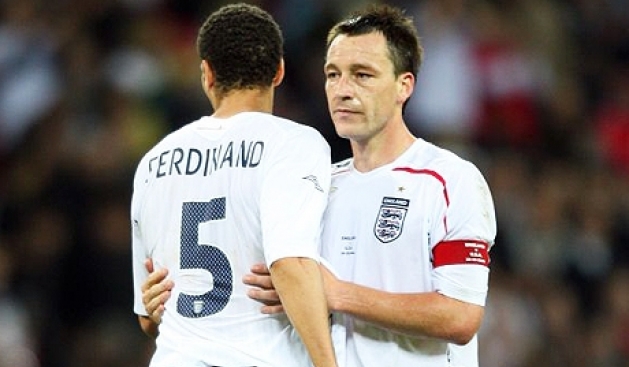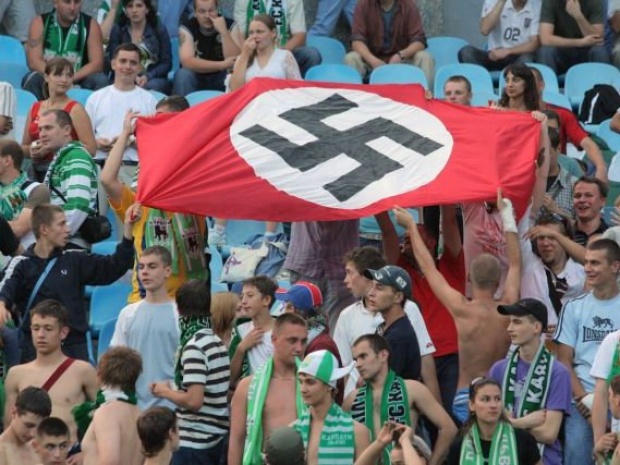Racism in football: a silence that says it all Comment
Ideas, New in Ceasefire - Posted on Friday, June 8, 2012 20:23 - 1 Comment
John Terry and Rio Ferdinand
At the end of a footballing season that has seen two major allegations of racial abuse on the pitch, Britain finds itself entering the Euro 2012 competition still embroiled in racial controversy. Again, there are two issues to be raised here; the first being the racist nature of some of the supporters in the host nations of Poland and Ukraine.
In an open Netherlands training session in Krakow on Wednesday, players were subjected to monkey noises from fans. Uefa have claimed that the chanting was not racist, but was in protest to no games being held in Krakow, and so are not going to be taking any action over the incident.
Mark Van Bommel, the captain of the Holland squad has spoken openly about his black team mates being targeted and in regarding Uefa’s response said: “Open your ears. If you did hear it and don’t want to hear it, that is even worse.”
The Bulgarian Football Union were fined £34,000 after Black England players were racially abused during one of the qualifying rounds. According to the BBC, however, Manchester City received a bigger fine for returning to the pitch late than what Porto were fined when Mario Balotelli was racially abused by their fans. A recent BBC Panorama documentary exposed Nazi salutes and monkey noises made at black players from hardcore groups of supporters known as Ultras.
What is most shocking is that officials did nothing about it, and adamantly denied that any racist behaviour goes on in the terraces. This is worrying for any Black fans who may be following England to their games, and with the families of Theo Walcott and Alex Oxlaide-Chamberlain publicly stating that they will not be travelling to the tournament, there seems to be reason to fear that racial abuse will occur.
So the question needs to be raised: should a country that clearly has an issue with this form of racism be allowed to host a major sporting event? It will be interesting to see how UEFA handles any incidents that might occur – they maintain that they have a zero-tolerance stance on racism and have reminded referees that they have the power to call off a game should any racism occur.
The headline-grabbing Mario Balotelli has recently been quoted as saying that he would ‘kill anyone who threw a banana’ at him during the competition, and that he will walk off the pitch if racially abused. He has also registered both his original Ghanaian name Barwuah, and his adopted name Balotelli as the names he will wear on his shirt, a deliberate and bold statement.
Though young and known for his outspokenness and sometimes volatile behaviour, it is disconcerting that Balotelli is one of the few players who seem to have the strength of character to speak publicly about the issue.
The second concern for the Euro 2012 tournament comes from closer to home. In many professional jobs, one could expect to be suspended from work while awaiting a court trial for allegations of racial abuse. However, normal standards don’t tend to apply when it comes to professional footballers, so John Terry’s court case was adjourned until after the Euros, so as to allow him to play.
Fans display a Nazi flag during a league game in Ukraine, co-host of Euro 2012 this summer
With defender Gary Cahill suffering a fractured jaw during last weekend’s friendly with Belgium, new manager Roy Hodgson was required to draft in a replacement – he chose Liverpool’s Martin Kelly, a player who has only been capped once for his country, over Rio Ferdinand, a former England captain with 81 games under his belt.
Of course, Ferdinand might not have had the greatest of seasons by his standards, but he was still seconds away from winning the title and played more league games than Kelly. Indeed, many believe his experience and track record make him precisely the sort of player the team needs.
What is disappointing, however, is Hodgson’s refusal to admit that his decision is clearly motivated by political reasons, rather than footballing ones. John Terry is accused of racially abusing Anton Ferdinand, Rio’s younger brother, and Hodgson has simply sided with Terry over Ferdinand, supposedly due to “team dynamics”.
This is clearly a bad decision, one made by the same man, let us not forget, who chose to play for South African side Berea Park F.C during the sporting boycott of the country during the apartheid – another decision apparently made for ‘footballing’ reasons.
Rio Ferdinand’s willingness to speak out about his disappointment at Hodgson’s decision is commendable; less impressive, however, is his rather odd decision not to publicly reveal the reasons for said disappointment.
Ex-Liverpool player Robbie Fowler has recently joined the debate in saying that there was “not a chance Ferdinand was left out for footballing reasons”, along with Netherlands forward Rafael Van Der Vaart, who called Ferdinand “one of the best defenders in England, maybe the world”.
In such a context, it appears that Poland is not alone in its problems with racism in football. Like their Polish counterparts, English football’s higher echelons have opted to not see what is in front of their eyes. Whenever confronted with racism, whether on the pitch or off it, all we seem to hear is that familiar, complicit silence.
1 Comment
Andy




Racism is a huge problem in Eastern Europe. From what I’ve heard, there’s not many black people over there to be abused. But Slovakia and Bulgaria see periodic anti-Roma pogroms. In Poland, it’s normal for fans to call rival teams “Jews” as an insult. In Russia, neo-Nazis and football hooligans went on a rampage of attacks against migrants from the Caucasus region in December 2010. In Hungary, a far-right party with its own militia is now the largest party in parliament. I’m not sure what exactly the dynamics are behind all this, but it’s far more than a question of a few extreme hooligans. Part of the background is the declining standard of living of the Eastern European poor in the aftermath of the transition to neoliberalism – resulting both from rising inequality and actual economic decline. But one would expect the resulting anger and despair to lead to leftist and autonomous forms of politics. For some reason it seems to have been channelled into ultranationalism instead – perhaps because the left is so discredited there, perhaps because nationalism is the dominant ideology. Of course nationalism carries racism on its coat-tails, indeed often implies it directly.
Further west, there’s a lot of big secrets about racism today. One of these being the continuities between official integrationism or assimilationism, and racism. The mainstream would have us believe that widespread anti-immigration sentiment “is not racist” and that there is a world of difference between Jack Straw’s Muslim-baiting or Cameron’s demand for “British values” and the explicit offensiveness of monkey noises or Hitler salutes.
Hidden beneath this is the secret that British, American or Western European populations are racist in vast numbers – not just the small minority who get caught breaking the law. And all of this is sustained by a paradoxical media construction – “we”, the (white) middle-class TV viewers or newspaper readers, look down on and condemn “them”, the racist scum of the sink estates, the football hooligan milieu or the barbarous East of Europe (which after all, is dangerously close to being Middle Eastern or Asian) – even while continuing to object to “burqas”, call for limits on immigration, oppose Dale Farm and support police brutality and stop-and-search. The continuation of racism can be disavowed beneath the condemnation of the more extreme fringe of racism, which serves as a kind of alibi for ‘polite’ racism – the ‘unacceptable’ racism of the other used to keep ‘acceptable’ racism invisible.
Another of the difficulties is that anti-racism has been tamed and recuperated into the “control society” agenda – racism gets added to the list of “unacceptable” attributes Middle England will not tolerate, enforced by an apparatus of banning orders, cameras at grounds, provocative policing/stewarding and a climate of criminalisation. The paradox being that the mainstream applies intermittently to extreme racists the same apparatus it uses systematically against Black and Asian people – thereby adding an alibi for this apparatus also.
It may even be that racism is being stoked and politicised by the broader curtailment of fan culture. There’s an academic article suggesting that the suppression of inter-firm conflict by football hooligans is the main cause of the EDL – basically, young men denied the testosterone outlet of intergroup conflict found a less easily suppressible outlet in quasi-political racism.
c.f. also: http://sistersofresistance.wordpress.com/2011/12/03/cross-post-my-tram-experience-doing-racism-wrong-nicole-black/
So the question is, how to fight against extreme racism without falling into complicity with the state’s use of ‘anti-racist’ repression as a pretext for the continuation of a racist prison-industrial apparatus.
I think the way forward may be suggested by the efforts of groups such as ARA and Class War in the 1980s, who fought racism among football fans by creating alternative, anti-racist and anti-fascist groups on the terraces. These groups also exist in countries such as Italy and Greece, and are often coextensive with broader autonomous movements, providing a more meaningful outlet for social frustrations and intergroup rivalries.
A “liberal” reform agenda might aim to destroy the insertions of racism in the establishment. Shut down the Sun and the Mail, perhaps through a journalistic code of conduct; take issues such as immigration off the political agenda, perhaps by giving more immigrants the vote and stopping politicians from race-baiting; demand that holders of political positions (from juries to police to MPs) take biometric tests for racial bias, with exclusions of those who turn out to be racist; teach sociology, colonial history, and multicultural dialogue in schools. Gradually, racism would go the same way as its more extreme manifestations today, becoming a fringe phenomenon. But as with existing anti-racist laws, this could be abused to extend state control more broadly, or to target militant anti-racism for alleged anti-white prejudice.
However, I wonder if racism can be done away with, without destroying the racialised structures of imperialist capitalism. While a global apartheid system remains in place, it will always be a case of struggling against the flow to try to stem its ideological correlates.
What are your thoughts on this? How do you think we can stem this kind of racism, when the people who are meant to be stopping it seem so bound-up in it?